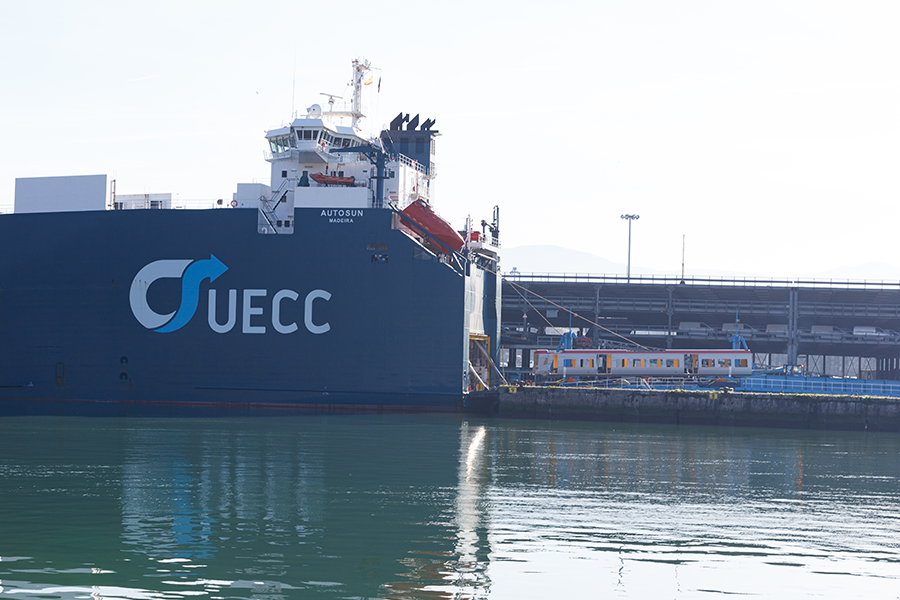Iberdrola España to implement a new technology in Pasaia for the decarbonisation of the port
- The technology is called Onshore Power Supply (OPS) and will allow ships at berth to be supplied with renewable energy.
- The shipping company UECC will be the first company to benefit from the new electricity supply point to reduce the environmental and acoustic impact of the activity of its ships in the port.
- The initiative has the support of the Ministry of Transport, Mobility and Urban Agenda (MITMA), as it has been selected in the Programme of Support for Sustainable and Digital Transport in competitive concurrence, within the framework of the Recovery, Transformation and Resilience Plan - financed by the European Union - NextGenerationEU.

The International Maritime Organisation (IMO) has set the goal of reducing emissions in maritime transport as soon as possible and reaching net zero emissions by 2050.
For its part, in 2021 the European Commission published the Fit for 55 package, a set of proposals which, among other measures linked to maritime transport, promotes the use of electricity in port as one of the mechanisms for achieving the decarbonisation objectives of the member countries of the European Union.
In this context, the Port of Pasaia, together with Iberdrola España, will implement an innovative OPS (Onshore Power Supply) infrastructure to supply the electrical demands of moored ships with renewable energy and thus reduce their levels of atmospheric and noise pollution.
The initiative launched by Iberdrola España is supported by the Ministry of Transport, Mobility and Urban Agenda (MITMA) through the Sustainable and Digital Transport Support Programme within the framework of the Recovery, Transformation and Resilience Plan, financed by the European Union's Next Generation funds. The project presented by Iberdrola España "Deployment of Onshore Power Supply (OPS) technology and decarbonisation of the electricity supply in the ports of Pasaia, Vigo and Alicante" was selected by MITMA to receive a grant of €1.9 million.
The system allows ships to be connected to the shore power grid during their stay in port, so that the auxiliary engines used for their auxiliary systems (transfer pumps, refrigeration systems, lighting, emergency equipment, etc.) can be kept off during the entire time the ship is docked for loading and unloading of goods or people.
Specifically, the electricity company will develop an energy system at the Kaputxinos quay in Pasaia to provide service to the Ro-Ro type vessels loaded with vehicles of the UECC shipping company, one of the main traffics of the port.
"UECC has shown a great interest in having this infrastructure and has opted for hybrid technology in its three new ships. In addition, an increasing berthing scenario has been foreseen so that between the three of them they will make between one and five weekly calls", emphasises David Candelario, director of the Port Authority.
The installation of an OPS, or cold ironing, charging point will substantially reduce greenhouse gas emissions and improve air quality in the Port environment, since, according to Candelario, "when the energy comes from a renewable source, emissions at ship calls will be reduced to 100%".
Furthermore, according to estimates by the International Maritime Organisation (IMO), the use of these emerging technologies can reduce the noise impact produced by ships during loading and unloading operations by up to 16 decibels, thus improving the quality of life of residents in the vicinity of the port.
In short, the advantages of this system include savings compared to traditional fuels, a reduction in local emissions emitted into the atmosphere, a reduction in vibrations and noise produced during docking, and less wear and tear on auxiliary engines. Furthermore, the decarbonisation of the energy supply will be greater as Iberdrola España will supply the ships with photovoltaic energy generated on site.
Coverage of the rest of the port environment
In addition, when the ships adapted to the electrified system are not berthed, the surplus photovoltaic energy will be used to cover other operators and customers in the port environment by exploring collective self-consumption modalities, in which the electricity company assumes the initial investment.
"In the event of having additional surpluses, they will be fed into the electricity grid to achieve shared self-consumption and supply green energy to the rest of the energy needs of the port area", explains Eduardo Lobato, Iberdrola España's Commercial Representative for the Northern Zone.
Iberdrola España's Pasaia port ecosystem electrification project starts after the awarding of the administrative concession and is expected to be up and running in 2025.
The OPS station will be equipped with a ship connection kit, a mobile device with an articulated arm, similar to a crane, which will allow the cable to be connected to the ship quickly and safely.
According to calculations made by Puertos del Estado, the reduction in emissions achieved after replacing on-board electricity generation, produced by burning fuel, with the ship's own connection to the grid is drastic: 96% of NOx, 8% of SOx, 94% of particles and 64% of CO2. The reduction is greater in the case of supplying with renewable energies, as will be the case in Pasaia.